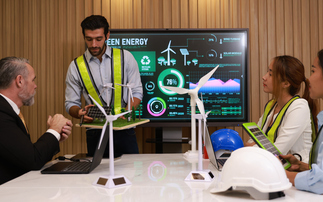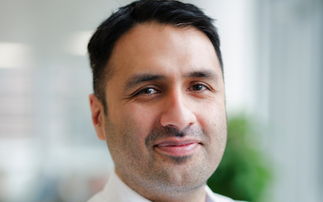Welcome to the BusinessGreen Future Jobs Hub, supported by Green GB Week
It is one of the biggest advantages of the transition to a net zero emission economy, alongside the averting of catastrophic climate change and the nurturing of a habitable biosphere, obviously. And yet the creation of millions of green jobs is rarely highlighted and often poorly understood.
Confusion over what constitutes a green job, what sustainability roles actually entail, and how you might go about getting one is widespread. Last week's government survey of 1,000 young people aged between 18-24 revealed nearly two thirds are interested in working in the green economy, but more than 70 per cent underestimate the number of green roles that are set to be on offer over the coming years.
This is understandable. The burgeoning green economy and the exciting new employment opportunities it creates rarely enjoy the media profile they deserve. The sector already employs hundreds of thousands of people - comfortably more than work in aerospace or pharmaceuticals - but you wouldn't necessarily know it from the balance of media coverage.
Moreover, it is difficult to define what amounts to a green job. Earlier this year the Office of National Statistics published data on the low carbon and renewable energy (LCRE) sectors, which found the sector grew five per cent in 2016 and supported 204,000 full time roles. Sounds impressive, but previously the government had used a different set of metrics for the Low Carbon and Environmental Goods and Services (LCEGS) sector and had concluded that as of 2013 the various industries covered by that data set employed approaching half a million people. The precise size of the green job opportunity varies considerably depending on whether you regard noise consultants, contaminated land experts, or water engineers as part of the green economy.
However, one thing is clear. The green jobs market is growing - and fast.
There are two main reasons for this. Firstly, the highly popular industries at the heart of the green economy - renewable energy, electric vehicles, smart technologies - are growing far faster than the underlying economy and will continue to do so as the UK strives to decarbonise. Secondly, the long term vision of a creating a net zero emission economy will require every business and every industry to slash its greenhouse gas emissions and for whole new sustainable industries to emerge. To some extent every business will have to become a green business and every job will have to become a green job, and all before most people under 40 have retired.
It is easy to see why the government estimates that the green economy will create two million jobs between now and 2030. It is also easy to see how this is likely to prove a highly conservative estimate. As car manufacturers become electric vehicle manufacturers, builders become experts in delivering net zero emission homes, and the government's farming subsidy reforms create whole new markets for environmental conservation, the resulting jobs boom could quickly make the green economy one of the dominant forces in the labour market.
But creating jobs is one thing, filling them is another challenge altogether, which is why BusinessGreen is delighted to launch the Future Jobs Hub as part of Green GB Week. It will showcase the huge range of green roles on offer and the immense rewards they bring to the people striving to build a greener Britain.
Over the course of this week we'll be running a series of interviews and video profiles with some of the people who are already engaged in the jobs of the future. From e-bike 'cargonauts' and sustainable fashion designers to urban farmers and offshore wind engineers, we'll highlight how green businesses aren't just driving down environmental impacts, they are also supporting a wide range of attractive and rewarding new jobs.
What do these green jobs have in common? Is there a single thread that unites them, beyond the commitment to tackling environmental challenges and delivering more sustainable business models?
There is certainly enormous variation - the working lives of a sustainability executive at a blue chip firm and an organic farmer in rural Scotland are obviously very different. But almost everyone we spoke to for this week's Future Jobs Hub did point to a handful of similarities in their roles. The green economy is ultimately about disrupting business-as-usual and developing new approaches. An ability to assess the status quo and then apply problem-solving skills are a fairly universal requirement for all green roles.
A disproportionate number of green roles are also technical in nature - a decarbonised economy will need a lot of new infrastructure - and as such science, technology, engineering, and maths skills are likely to become ever more important. Equally, the case for helping to re-skill people working in high carbon industries that are likely to come under ever more regulatory and commercial pressure is clear.
However, not every green role requires advanced engineering or technical skills. For example, it is a rare green role that does not demand some form of communications and advocacy skills. Whether it is through informal chats with customers and colleagues or official training programmes, the need to bring other people along for the ride as the green transition gathers pace is critical.
Consequently, almost everyone who works in the green economy - whether their day job involves wind turbines or vegan leather - believes that a genuine passion for tackling the world's big picture environmental challenges and an optimistic desire to seize the opportunities sustainable development and clean technologies offer is a prerequisite.
The good news is more and more people have the the commitment required, as well as a desire to pursue the rewarding and fast-evolving opportunities the green economy. The BusinessGreen Future Jobs Hub aims to help anyone who has considered doing something 'green' in the future recognise that the jobs of the future are already here.










